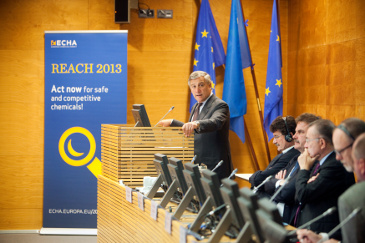Industry and Entrepreneurship
Chemicals
Europe's chemical industry: safe and competitive

The chemicals industry has changed the world in which we live, by making products cheaper, lighter and more resistant. It is a European success story that needs to be preserved.
Chemicals, plastics and rubber are some of the foundations of EU industry. Products of the chemicals sector have enabled innovation in the entire spectrum of industrial activities from car making to aviation, with a positive impact on economic growth, innovation, employment and exports.
Europe is a world leader in the sector with a one-fifth share of the global market. Technology advancements have allowed European firms to remain competitive and sell their products and ideas around the world for decades. Chemicals are also key to provide solutions to future challenges, such as the transition towards a low carbon economy.
"The chemicals industry has long been a European success story. We should make all efforts to maintain its high global ranking. To do so we must provide competitive energy prices, and find the right balance between our ambitious environmental policy and the needs of industries at risk of delocalisation."
But more remains to be achieved to promote higher energy efficiency in the chemical sector. Chemical factories need more energy - particularly oil and natural gas - than average plants, and their energy bills can be heavy. Energy costs are increasing in Europe, as compared to a general downward trend worldwide: European energy costs are three times higher than in the USA, and generally higher than in other competing regions.
In the last 20 years the chemicals industry has reacted to this pressure by reducing energy intensity and GHG emissions by 50% (while production has increased by 70%). Despite these improvements, energy cost increases mean that the most energy-intensive chemical companies may consider shifting their investment to the US or other more cost-friendly countries. In the worst scenarios, they shut down factories in the EU.
The Commission is at the forefront of reversing this worrying trend. A report on energy costs will soon be published to assess the negative impact of excessive energy bills on certain sectors, including chemicals. This will raise awareness for what is at stake economically and hopefully trigger necessary actions. We are also encouraging more legal certainty surrounding long term electricity contracts for industries with an intensive consumption of energy. This should provide lower prices to energy buyers, and more financial stability to energy sellers.
In parallel, innovation must also be promoted. American and Japanese competitors invest much more in research and development (R&D) than European chemicals companies do. Recycling is also key to the future of the sector, and represents an opportunity rather than a burden.
The Commission is working hard to provide a legal environment which makes life simpler for chemical companies, reducing red tape to minimum levels and encouraging investment.
Europe can boast the world's most advanced and safest chemicals legislation. REACH is a global standard setter. Our market works better thanks to this regulation and our citizens are safer. But we are also aware that the industry is faced with a heavy regulatory burden which can negatively affect its competitiveness. We are working to streamline REACH procedures and more easily enable smaller firms to manage the communication of information it requires.

